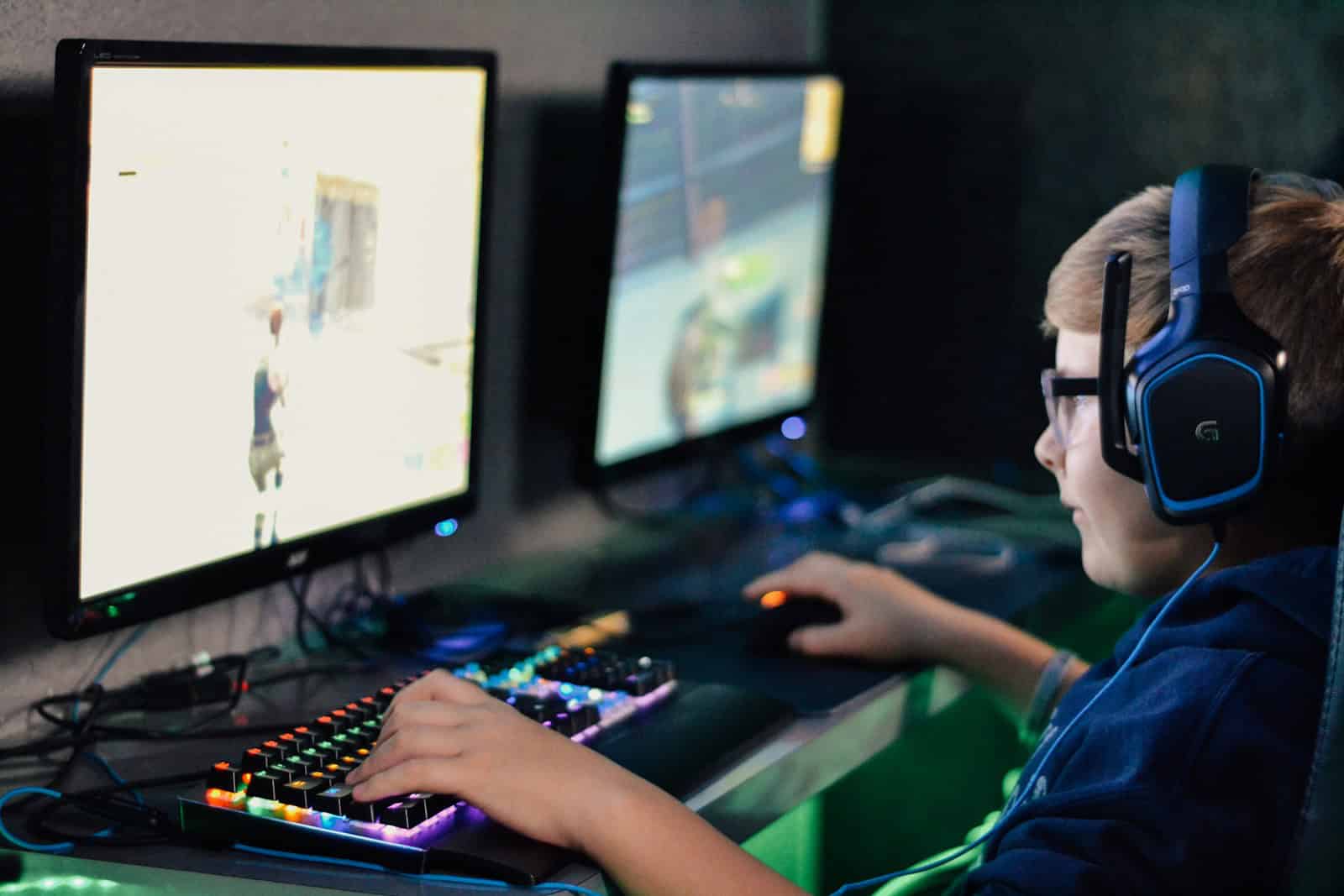
Gaming has become hugely popular worldwide. Video games now have a big impact on how we spend our leisure time, work, and connect with others. They bring people from all over the globe together. Over time, games have evolved from being simple to complex and realistic. They use advanced technology to create incredible virtual worlds, tell engaging stories, and give players important choices to make. Gaming is not only entertaining but also a major industry, generating billions of dollars in revenue each year.
Additionally, millions of people watch others play games online and some gamers have even become famous and wealthy. As gaming continues to progress, the line between virtual and reality becomes increasingly blurred. Gaming has a significant cultural influence and continues to advance rapidly due to technological developments. Let’s explore the captivating world of gaming, discovering its modern culture, emerging trends, and the exciting possibilities that lie ahead.
Digital Playgrounds: A Closer Look at Modern Gaming
Gaming’s Cultural Impact
Gaming has transcended its niche status to become a cultural phenomenon, influencing fashion, music, and even language. Popular games spawn dedicated communities, fostering social interaction and shared experiences. Esports tournaments draw massive audiences, rivaling traditional sports in viewership and engagement.
Technological Advancements in Gaming
Technological advancements continue to push the boundaries of gaming experiences. Virtual reality (VR) and augmented reality (AR) technologies offer immersive worlds, while cloud gaming eliminates the need for expensive hardware. Mobile gaming has exploded in popularity, making games accessible to a wider audience.
Emerging Trends in the Gaming Industry
The gaming industry is constantly evolving, with new trends emerging regularly. Cross-platform play allows gamers on different devices to connect, fostering inclusivity. Subscription services offer access to vast libraries of games for a monthly fee, changing how players consume content.

The Future of Gaming
The future of gaming holds exciting possibilities. Artificial intelligence (AI) promises more realistic and engaging experiences, while blockchain technology could revolutionize ownership of in-game assets. As technology continues to advance, the gaming landscape will undoubtedly transform, offering new and innovative ways to play and connect.
Table: A Snapshot of the Gaming Landscape
| Category | Trends | Impact |
|---|---|---|
| Cultural Influence | Esports, streaming, game-inspired fashion | Mainstream acceptance, social interaction, economic growth |
| Technological Advancements | VR, AR, cloud gaming, mobile gaming | Immersive experiences, accessibility, new business models |
| Emerging Trends | Cross-platform play, subscription services, microtransactions | Inclusivity, affordability, evolving monetization strategies |
| Future of Gaming | AI, blockchain, hyper-realistic graphics | Enhanced gameplay, decentralized ownership, heightened realism |
The Evolution and Impact of Gaming Culture
Games as Cultural Touchstones
Video games have become a major influence on our culture. They’re not just entertainment anymore. They affect fashion, music, and even the way we talk. Think about the game Fortnite. It has had a huge impact. It has held virtual concerts with famous musicians like Travis Scott and Ariana Grande. These events were incredibly popular, drawing millions of players. Fortnite also has partnerships with big brands like Nike and Marvel. This brings real-world fashion and characters into the game. Another example is “Cyberpunk 2077.” The game’s unique style has inspired fashion trends and even real-world clothing lines.
The Rise of Esports
Esports, or competitive video gaming, is another example of gaming’s growing influence. Games like League of Legends, Dota 2, and Counter-Strike: Global Offensive have huge professional scenes. The best players compete in tournaments with massive prize pools. These events can fill entire stadiums! Esports has become a global phenomenon, with millions of fans watching online. Streaming platforms like Twitch and YouTube Gaming have played a big role in this growth. They allow fans to watch their favorite players and teams compete live.
Diversity and Representation in Games
The gaming industry is making an effort to be more inclusive. Game developers are creating more diverse characters and storylines. This allows players from all backgrounds to see themselves reflected in the games they play. “Life is Strange: True Colors” features an Asian-American protagonist named Alex Chen. “Tell Me Why” tells a story about Tyler Ronan, a transgender man. These are just a few examples of games that are pushing for better representation. It’s also important to have diversity behind the scenes. More women and people of color are now working in game development. They bring new perspectives and ideas to the industry.
Making Games Accessible to Everyone
Games should be enjoyable for everyone. Developers are adding features to make games more accessible to players with disabilities. These features can include things like colorblind modes, customizable controls, and subtitles. Text-to-speech options can help players who have difficulty reading. These improvements are making gaming more inclusive and welcoming to all.
The Metaverse and Web3 Gaming
The future of gaming is full of exciting possibilities. The metaverse is one of the biggest trends right now. Metaverse platforms like Roblox and Sandbox allow players to create and share their own games and experiences. They can also socialize and interact with others in these virtual worlds. Web3 gaming is another emerging trend. It uses blockchain technology to give players more control over in-game assets. This could lead to new “play-to-earn” models where players can earn real money by playing games.
The Challenges of Cloud Gaming
Cloud gaming lets you play games without needing a powerful console or PC. The games are streamed over the internet, like watching a movie on Netflix. While this technology has a lot of potential, there are still some challenges. A strong internet connection is essential, and even then, there might be lag or delays in the game. Some players also worry about the impact on game ownership and preservation.
The Impact of Subscription Services
Subscription services like Xbox Game Pass and PlayStation Plus are changing how we play games. Instead of buying each game individually, players pay a monthly fee to access a large library of games. This can be a more affordable way to play a variety of games. However, it also raises questions about how developers will make money in the future.
Gaming Communities
Online communities play a big role in gaming culture. Platforms like Reddit and Discord allow players to connect with each other, discuss games, and share their experiences. These communities can be a great source of support and friendship. They also provide a platform for players to give feedback to developers and influence the future of games.
Social Issues in Gaming
Gaming is not without its problems. Online toxicity, harassment, and addiction are serious issues that need to be addressed. Many companies are working to create safer and more inclusive gaming environments. They are implementing tools to combat harassment and promoting positive behavior. It’s important for players to be aware of these issues and to do their part to create a positive gaming community.
Gaming and Mental Health
Gaming can have both positive and negative effects on mental health. On the one hand, games can provide stress relief, social connection, and a sense of accomplishment. On the other hand, excessive gaming can lead to addiction, isolation, and other mental health problems. It’s important to maintain a healthy balance and to be mindful of the potential risks.
AI and Procedural Generation
Artificial intelligence (AI) is being used in many ways to improve gaming experiences. One exciting application is procedural generation. This allows developers to create vast and dynamic game worlds that are different every time you play. AI can also be used to create more realistic and challenging opponents.
Hyper-Reality and Haptic Feedback
Imagine feeling the sensations of the game world as if you were really there. This is the promise of hyper-reality and haptic feedback. Haptic suits and advanced VR systems can provide physical sensations that correspond to in-game actions. This technology is still in its early stages, but it has the potential to revolutionize immersive gaming.
Key Takeaways
| Trend | Impact |
|---|---|
| Games as Cultural Touchstones (Fortnite concerts, Cyberpunk fashion) | Gaming influences fashion, music, and mainstream culture. |
| Esports (League of Legends, Twitch) | Creates professional opportunities for gamers and engages millions of fans. |
| Diversity and Representation (“Life is Strange: True Colors,” “Tell Me Why”) | Makes gaming more inclusive and reflects the diversity of players. |
| Accessibility (colorblind modes, subtitles) | Allows players with disabilities to enjoy games. |
| Metaverse and Web3 Gaming (Roblox, Sandbox) | Creates new platforms for social interaction and content creation. |
| Cloud Gaming (GeForce Now, Stadia) | Offers accessibility but faces challenges with latency and internet dependency. |
| Subscription Services (Xbox Game Pass, PlayStation Plus) | Changes game consumption habits and raises questions about developer revenue. |
| Gaming Communities (Reddit, Discord) | Fosters social interaction, support, and feedback. |
| Social Issues in Gaming (toxicity, harassment) | Highlights the need for safer and more inclusive gaming environments. |
| Gaming and Mental Health | Offers benefits like stress relief but also risks like addiction. |
| AI and Procedural Generation | Creates more dynamic and unpredictable game worlds. |
| Hyper-Reality and Haptic Feedback | Promises more immersive and realistic gaming experiences. |
Key Takeaways
- Gaming has become a major part of global culture
- Games use new tech to create immersive experiences
- The gaming industry is now a major economic force
Evolution of Gaming Platforms and Technologies
Gaming platforms have changed a lot over the years. New tech has shaped how we play games. Let’s look at the big shifts in gaming hardware and software.
From Arcades to Home Consoles
Arcade machines were the first place many people played video games. These big cabinets filled game centers in the 1970s and 1980s. Players used joysticks and buttons to control games like Pac-Man and Space Invaders.
Home consoles soon brought gaming to living rooms. The Atari 2600 was an early hit. It let people play games on their TV. Nintendo and Sega made popular systems in the 1980s and 1990s. The Super Nintendo and Sega Genesis had better graphics and sound.
PlayStation and Xbox joined the market later. These powerful consoles offered 3D graphics and CD-quality audio. Each new system pushed technology forward. Games became more complex and lifelike.
The Rise of Online and Mobile Gaming
The internet changed gaming forever. Online play let gamers compete with others around the world. Massive multiplayer games like World of Warcraft became huge hits.
Smartphones put games in everyone’s pockets. Simple apps like Angry Birds reached millions of players. Mobile games are now a major part of the industry.
Cloud gaming is the newest trend. Services like Nvidia GeForce Now and Google Stadia stream games over the internet. This lets people play high-end games without expensive hardware.
Virtual and Augmented Realities: The New Frontier
Virtual reality (VR) creates fully digital worlds. Players wear headsets to feel like they’re inside the game. Oculus and other companies make VR gear for homes.
Augmented reality (AR) adds digital elements to the real world. Pokemon Go was a big AR hit. Players caught virtual creatures in real places using their phones.
Both VR and AR are still new. But they offer exciting ways to play. As the tech improves, these could become major parts of gaming’s future.
Cultural Impact and the Business of Gaming
Gaming shapes culture and drives a massive industry. It influences how people connect, create, and consume entertainment worldwide.
Diversity, Inclusivity, and Representation in Gaming
Game makers are working to include more diverse characters and stories. This helps players see themselves in games. More women and people of color now work in game design. They bring fresh ideas to the field.
Games like “The Last of Us Part II” feature strong female leads. Others like “Spider-Man: Miles Morales” star heroes of color. These changes make games more welcoming to all players.
Accessibility options in games are improving too. Features like text-to-speech help players with disabilities enjoy games.
Emerging Trends in Gaming Culture and Community
Mobile gaming keeps growing fast. Smartphones let people play anywhere. Games like “Pokémon GO” blend real and virtual worlds.
Streaming is huge in gaming culture. Millions watch others play on Twitch and YouTube Gaming. Top streamers can earn big money from fans and sponsors.
Gaming conventions like E3 bring fans together. These events showcase new games and tech. They also celebrate gaming culture.
Economic Landscape: Revenue, Sponsorships, and Professional Gaming
The game industry makes billions each year. It’s bigger than movies and music combined.
Esports is now a pro sport. Top players earn millions from prizes and sponsors. Big brands like Coca-Cola sponsor gaming events and teams.
Games make money in new ways. Many offer free play but sell in-game items. Subscription services like Xbox Game Pass give access to lots of games for a monthly fee.
Companies invest in gaming tech. Virtual reality headsets create immersive experiences. Cloud gaming lets people play high-end games on basic devices.
Frequently Asked Questions
Gaming culture shapes society in many ways. It affects how people interact and what they value. Let’s explore some key questions about gaming’s impact.
What are the current social trends shaping the gaming industry?
Mobile gaming is growing fast. More people now play games on phones and tablets. Esports are also getting bigger. Pro gamers compete for big prizes in front of large crowds. Cross-platform play lets friends game together on different devices.
How has gaming culture evolved in recent years?
Gaming is more social now. Online multiplayer games connect people across the world. Streaming sites like Twitch let gamers share their play with others. Virtual reality creates new ways to experience games.
In what ways has gaming influenced popular culture and media?
Many movies and TV shows are based on video games now. Game music is played by orchestras in concert halls. Gaming terms have entered everyday speech. Cosplayers dress up as game characters at big events.
How do virtual relationships, such as those with E-pals, impact social dynamics in gaming?
Online friendships in games can be very strong. Players team up and chat while gaming. Some people meet their real-life partners through games. But there are also risks of online bullying or addiction.
Can we trace specific societal changes back to the rise of video gaming?
Games have changed how some people learn. Schools use games to teach math and science. Problem-solving skills from games can apply to real jobs. Some worry games cause violence, but research is mixed on this.
What role has gaming played in technological advancements and innovations?
Games push computer tech forward. They need powerful graphics and fast internet. Virtual reality got better because of gaming. AI in games is getting smarter. Some medical training uses game-like simulations.





